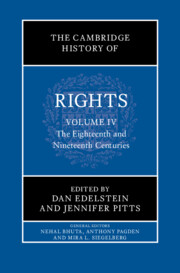Book contents
- the cambridge history of rights
- The Cambridge History of Rights
- The Cambridge History of Rights
- Copyright page
- Contents
- Figures
- Contributors to Volume IV
- General Introduction
- A Note on Translations
- Introduction to Volume IV
- Part I A Revolution in Rights?
- 1 Barbeyrac’s Intervention
- 2 Rights and the Bourgeois Revolution
- 3 Social Rights
- 4 Enlightenment Theories of Rights
- 5 Rights, Property, and Politics
- 6 Antislavery in the Age of Rights
- 7 Enlightenment Constitutionalism and the Rights of Man
- 8 Fundamental Rights at the American Founding
- 9 Declarations of Rights
- 10 The Rights of Women (or Women’s Rights)
- 11 The Image of Rights in the French Revolution
- Part II Postrevolutionary Rights
- Part III Rights and Empires
- Index
- References
4 - Enlightenment Theories of Rights
from Part I - A Revolution in Rights?
Published online by Cambridge University Press: 22 January 2025
- the cambridge history of rights
- The Cambridge History of Rights
- The Cambridge History of Rights
- Copyright page
- Contents
- Figures
- Contributors to Volume IV
- General Introduction
- A Note on Translations
- Introduction to Volume IV
- Part I A Revolution in Rights?
- 1 Barbeyrac’s Intervention
- 2 Rights and the Bourgeois Revolution
- 3 Social Rights
- 4 Enlightenment Theories of Rights
- 5 Rights, Property, and Politics
- 6 Antislavery in the Age of Rights
- 7 Enlightenment Constitutionalism and the Rights of Man
- 8 Fundamental Rights at the American Founding
- 9 Declarations of Rights
- 10 The Rights of Women (or Women’s Rights)
- 11 The Image of Rights in the French Revolution
- Part II Postrevolutionary Rights
- Part III Rights and Empires
- Index
- References
Summary
This chapter proposes an alternative to the more economically driven historiography on French Enlightenment rights talk, by highlighting the role of philosophers, most notably Locke and Rousseau. It was their insistence on the inalienability of liberty that defined the philosophical discourse of rights in the eighteenth century. Locke repudiated the standard argument by natural lawyers (from Grotius to Pufendorf) that we could alienate our freedom, either by selling ourselves into slavery or subjecting ourselves to an absolutist sovereign. In both of these cases, we violate our right to self-preservation, which as a dictate of natural law is sacrosanct. Montesquieu similarly rejected Roman arguments for slavery in the name of self-preservation. And Rousseau insisted on the inalienability of liberty, through an operation (the social contract) that transforms natural liberty into political freedom. These arguments, too, informed the revolutionary understanding of human rights.
Keywords
- Type
- Chapter
- Information
- The Cambridge History of Rights , pp. 93 - 113Publisher: Cambridge University PressPrint publication year: 2024

